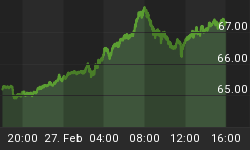With fiscal time bombs ticking in both Europe and the United States, the pertinent question for now seems to be which will explode first. For much of the past few months it looked as if Europe was set to blow. But Angela Merkel's refusal to support a Federal Reserve style bailout of European sovereigns and her recent statement the she had no Hank Paulson style fiscal bazooka in her handbag, has lowered the heat. In contrast, the utter failure of the Congressional Super Committee in the United States to come up with any shred of success in addressing America's fiscal problems has sparked a renewed realization that America's fuse is dangerously short.
Chancellor Merkel has been emphatic that European politicians not be given a monetary crutch similar to the one relied on by their American counterparts. Her laudable goal, much derided on the editorial pages of the New York Times, is to defuse Europe's debt bomb with substantive budget reforms, and as a result to make the euro "the strongest currency in the world." Much has been made of the poorly received auction today of German Government bonds, with some saying the lack of demand (which pushed yields on 10-year German Bonds past 2% --hardly indicative of panic selling) is evidence of investor unease with Merkel's economic policies. I would argue the opposite: that many investors still think that Merkel is bluffing and that eventually Germany will print and stimulate like everyone else. It is likely for this reason that yields on German debt have increased modestly.
In contrast, the U.S. is crystal clear in its intention to ignore its debt problems. With the failure of the Super Committee this week it actually became official. American politicians will not, under any circumstances willingly confront our underlying debt crisis. While the outcome of the Super Committee shouldn't have come as a great surprise, the sheer dysfunction displayed should serve as a wakeup call for those who still harbor any desperate illusions. Some members of Congress, such as John McCain, have even come out against the $1.2 trillion in automatic spending cuts that would go into effect in January 2013. Expect more politicians of both parties to cravenly follow suit.
Over the next decade, the U.S. government expects to spend more than $40 trillion. Even if the $1.2 trillion in automatic cuts are allowed to go through, the amount totals just 3% of the expected outlays. In a masterstroke of hypocritical accounting, $216 billion of these proposed "cuts" merely represent the expected reductions in interest payments that would result from $984 billion of actual cuts. These cuts won't make a noticeable dent in our projected deficits, which if history can be any guide, will likely rise by much more as economic reality proves far gloomier than government statisticians predict. Finally, the cuts are not cuts in the ordinary sense of the word, where spending is actually reduced. They are cuts in the baseline, which means spending merely increases less than what was previously budgeted.
In the mean time, the prospect of sovereign default in Europe is driving "safe" haven demand for the dollar. So contrary to the political blame game, Europe's problems are actually providing a temporary boost to America's bubble economy. However, a resolution to the crisis in Europe could reverse those flows. And given the discipline emanating from Berlin, a real solution is not out of the question. If confidence can be restored there, each episodic flight to safety may be less focused on the U.S. dollar. Instead, risk-averse investors may prefer a basket of other, higher-yielding, more fiscally sustainable currencies.
The irony is that Europe is actually being criticized for its failure to follow America's lead. This misplaced criticism is based on the mistaken belief that our approach worked. It did not. Sure, it may have delayed the explosion, but only by assuring a much larger one in the future. In the mean time, many have mistaken the delay for success.
However, if Merkel's hard line works, and real cuts follow, Europe will be praised for blazing a different trail. As a result the euro could rally and the dollar sinks. Commodity prices will rise, putting even more upward pressure on consumer prices and interest rates in the United States.
Any significant reversal of the current upward dollar trend could provide a long awaited catalyst for nations holding large dollar reserves to diversify into other currencies. My guess is that Merkel understands the great advantage the U.S. has enjoyed as the issuer of the world's reserve currency. I believe she covets that prize for Europe, and based on her strategy, it is clearly within her reach.
There is an old saving that one often does not appreciate what one has until it's lost. The nearly criminal foolishness now on display in Washington may finally force the rest of the world to cancel our reserve currency privileges. The loss may give Americans a profound appreciation of this concept.
For an even more in depth look at the prospects of international currencies, download Peter Schiff's and Axel Merk's Five Favorite Currencies for the Next Five Years.
Subscribe to Euro Pacific's Weekly Digest: Receive all commentaries by John Browne, Peter Schiff, and other Euro Pacific commentators delivered to your inbox every Monday.
For a great primer on economics, be sure to pick up a copy of Peter Schiff's hit economic parable, How an Economy Grows and Why It Crashes.















